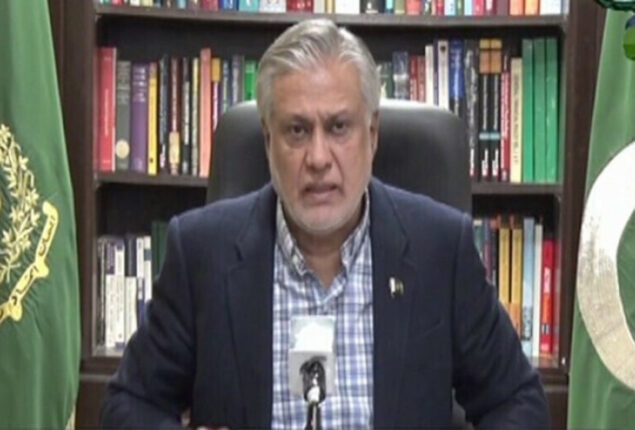Ishaq Dar vows to make banking system in accordance with Islamic teachings
He said switching over banking system was big challenge He resolved to...

Ishaq Dar says before IMF deal, taxes worth Rs170bn will be imposed
Finance Minister Ishaq Dar stated that negotiations with the international lender ended “positively” and that in order to restart the loan program, the government would need to impose Rs170 billion in taxes through a mini-budget, hours after the International Monetary Fund (IMF) released a statement on its discussions with Pakistan on Friday, BOL News reported.
The finance minister told the media that the draft of the government’s Memorandum of Economic and Financial Policies (MEFP) had been received from the Washington-based lender.
Earlier in his media appearance, the Finance Minister recalled that the programme the current administration was implementing was one that former prime minister Imran Khan had agreed to with the IMF for the period of 2019–2020. He reaffirmed that the negotiations are being held by the Shehbaz Sharif-led administration as a “sovereign commitment.”
He said, “this is an old agreement which had been suspended and delayed previously.”
The Finance Minister continued by stating that the 10-day negotiations between Pakistan and the IMF team covered a wide range of topics, including the electricity and gas sectors as well as the fiscal and monetary aspects.
Ishaq Dar said, “The SBP governor and officials from different departments and ministries participated in the talks.”
The finance minister shared the broad strokes of the agreement agreed with the IMF and stated that taxes measures totaling Rs170 billion, not the rumored Rs700-800 billion, will be implemented.
Dar stated that the Rs170 billion in taxes must be retrieved in this fiscal year’s final four months.
Dar stated that the energy industry will undergo reforms, with the main goal being to halt the flow of circular debt. He declared that untargeted subsidies would be reduced to a minimum and the revolving debt in the gas sector would be eliminated.
The finance minister said that some of the IMF-recommended reforms will benefit Pakistan.
Dar emphasized the need for reforms in Pakistan and said that Shehbaz Sharif, the country’s prime minister, had promised the IMF that they will be carried out.
A MEFP and a letter of intent are sent in accordance with standard practice. He said, “The government has received the MEFP draft this morning and we will go through it on the weekend. A virtual meeting with the IMF will be held after that on Monday.”
“We believe that there are some sectors that need to be reformed in Pakistan’s interest.”
The economy is bleeding, according to the finmin, and it is currently ranked number 47.
He demanded that it be corrected and placed the blame on those whose poor leadership and management caused the economic collapse.
Dar stated that although Rs3,000 billion is spent on the production of electricity, only Rs1,800 billion is recovered.
He insisted, “We will have to undertake these reforms, even though they are painful.”
He claimed that Pakistan will complete the IMF program for a second time once the government made the decision. Following the Executive Board of the IMF’s approval, Pakistan would get $1.2 billion.
He claimed that in order to lessen the impact of inflation on the most vulnerable groups in society, it was agreed to boost the budget of the Benazir Income Support Program (BISP) by Rs40 billion to Rs400 billion.
The minister promised that the declining foreign exchange reserves will be increased. He added that it is managed by the State Bank of Pakistan (SBP) and that some friendly nations have made obligations.
Ishaq said, “Pakistan had made big repayments to countries during this time, and once the programme is finalised, we will get the amount back.”
Dar attributed the credibility gap to the previous administration, claiming that the IMF doesn’t trust Pakistan because the nation not only failed to put reforms into place but also went back on them during the no-confidence vote.
He continued, “This has damaged Pakistan’s reputation and this has impacted the latest talks as [the IMF] is unsure if we would agree to it.
He also said that the IMF gave in because the government refused to tax gasoline. The lack of a sales tax on petroleum items was “mutually agreed upon,” he claimed. He further stated that the Rs170 billion would be increased by general sales taxes.
Catch all the Pakistan News, Breaking News Event and Latest News Updates on The BOL News
Download The BOL News App to get the Daily News Update & Follow us on Google News.